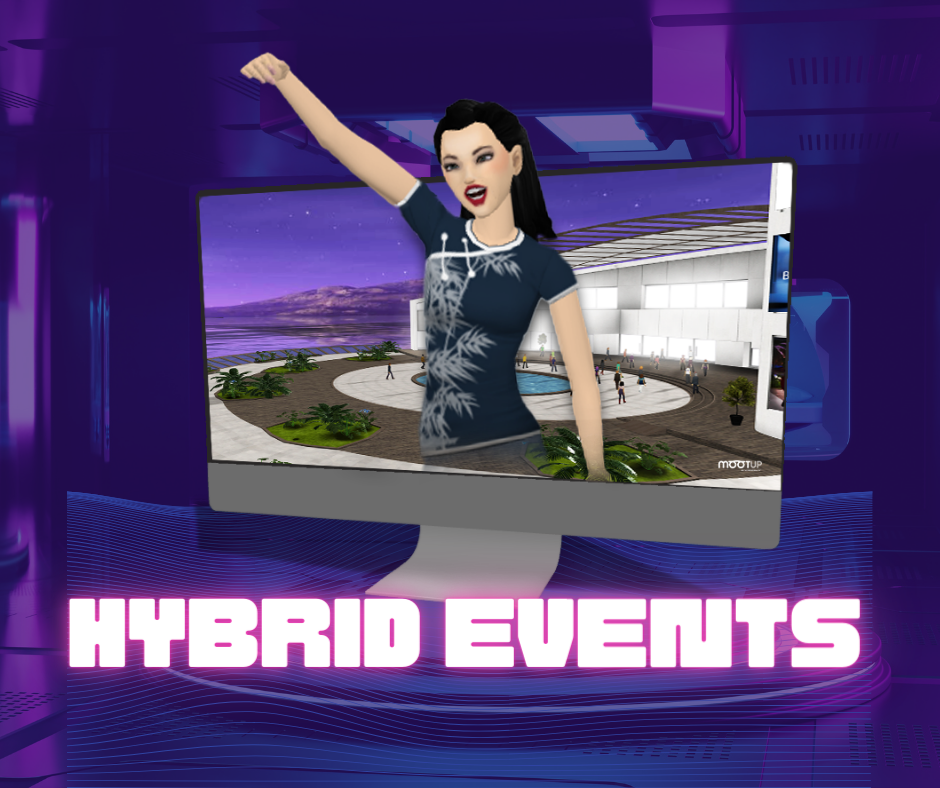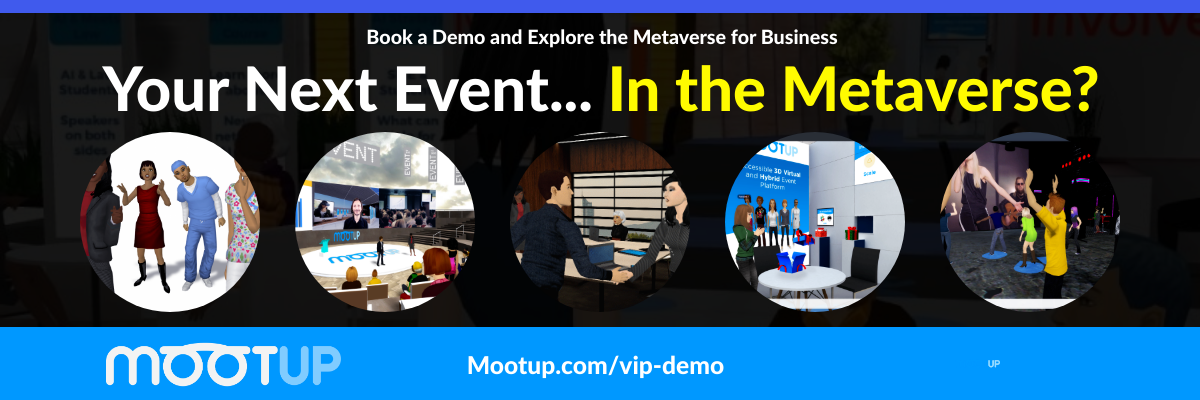Are you looking for an innovative way to host virtual vendor events? With the emergence of no-code platforms, producing and hosting a wide range of virtual and hybrid events in the metaverse is possible. From craft fairs to vendor shows, this article will provide insights on how you can plan and prepare for successful virtual vendor events. We’ll also explore some tips to help ensure your event runs smoothly and any challenges associated with hosting these online gatherings. Get ready to learn all about planning and producing amazing virtual vendor events.
Table of Contents:
- How to Plan and Prepare for a Virtual Vendor Event
- Tips for Hosting a Successful Virtual Vendor Event
- Challenges of Hosting a Virtual Vendor Event
- No-Code Platforms for Producing & Hosting Virtual & Hybrid Events in the Metaverse
- FAQs about Virtual Vendor Events
- What are the benefits of hosting a virtual vendor event?
- How can I ensure my virtual vendor event is engaging for attendees?
- What technology do I need to host a successful virtual vendor event?
- How do I measure success after hosting a virtual vendor event?
- Are there any best practices for marketing and promoting my virtual vendor event?
- Conclusion
How to Plan and Prepare for a Virtual Vendor Event
Planning and preparing for a virtual vendor event can be intimidating, but with the proper knowledge and resources, it doesn’t have to be. The key is to set realistic goals, choose the best platform for your needs, create an engaging experience for attendees, promote your event effectively, and set up logistical details beforehand.
To start on the right foot, you need to establish clear objectives that are achievable within the scope of your virtual vendor event. What knowledge do I want my guests to gain? What outcomes do I hope to gain from this virtual event? These objectives will help guide all other decisions related to planning and hosting your event.
Once you know what you want from the event, decide which platform works best for achieving those goals. Many options are available today, from video conferencing services like Zoom or Webex, virtual reality platforms like Sansar or High Fidelity VRChat, or more specialized solutions tailored specifically to events such as EventMobi LiveStreaming. It’s essential that whatever platform you select meets all of your requirements, so research each one thoroughly before making a decision.
Creating an engaging experience is essential when hosting any virtual vendor event – after all, if no one shows up, there won’t be much point. You’ll need to think about how people will interact with each other during the session; consider adding activities such as polls or quizzes that involve audience participation to keep them engaged throughout the meeting/event. Additionally, incorporating multimedia elements into presentations can help break up monotony while giving participants something exciting and memorable to which they can look forward.
In addition to providing an enjoyable experience, it is also essential that you promote your upcoming virtual vendor events well in advance, so potential attendees know about them beforehand. Utilize social media outlets such as Facebook and Twitter and email marketing campaigns targeting industry professionals who may benefit from attending these types of sessions. Word-of-mouth can be beneficial too. Lastly, setting up logistical details prior helps ensure everything runs smoothly once everyone has arrived – things like assigning moderators roles/responsibilities and creating discussion topics should be done ahead so there isn’t any confusion during the execution phase later on down the line.
Planning and preparing for a virtual vendor event is essential to ensure its success. Having the correct apparatus, approaches, and plans set up can make an immersive encounter that will pull in participants and create results. Now, look at some tips for hosting a successful virtual vendor event.
Key Takeaway: To successfully plan and host a virtual vendor event, it’s important to set achievable goals, select the right platform for your needs, create an engaging experience for attendees, promote ahead of time, and ensure all logistical details are squared away. In other words: do your homework before hitting the go button.
Tips for Hosting a Successful Virtual Vendor Event
When hosting a successful virtual vendor event, utilizing technology is key. Video chat programs that enable people to communicate and watch slideshows in real time should be used for a successful virtual vendor event. In addition, employing social media can broaden the reach of your message and facilitate a stimulating experience for participants. Be sure to provide adequate personnel and assistance during the event so that any tech troubles can be promptly addressed. Finally, offering incentives such as discounts or prizes will increase engagement and motivate attendees to participate more actively in the event.
Technology is essential for creating a memorable virtual vendor event experience. To ensure all participants can access features like audio/video streaming, screen sharing, chat rooms, etc., consider investing in reliable video conferencing software like Zoom or Microsoft Teams. Vendors can utilize video conferencing tools such as Zoom or Microsoft Teams to exhibit their offerings and interact with potential customers globally without moving away from their place. Additionally, take advantage of social media platforms like Twitter and Instagram by promoting your virtual vendor events through posts featuring eye-catching visuals and hashtags related to the topic at hand – this will help draw attention from users who may not otherwise know about your events.

To ensure a successful virtual vendor event, adequate staffing and support services should be available. This includes customer service representatives to address any technical issues during the event and moderators to keep conversations on course. Moreover, incentivizing attendees with discounts or prizes will not only boost engagement but also help drive sales leads. Keywords: Active Voice, Idioms & Colloquialisms, Proper Grammar & Spelling, Punctuation
In conclusion, several necessary steps are involved when planning a successful virtual vendor event. From choosing appropriate technology solutions for hosting sessions online to providing incentives that encourage participation amongst guests, it is possible to create an enjoyable experience that both vendors and customers will remember fondly.
You can ensure a successful virtual vendor event by utilizing the right technology, leveraging social media, and having adequate staffing and support services available during the event. With that said, hosting such an event is not without its challenges – overcoming technical difficulties and limitations while ensuring quality interactions with attendees are just some of them.
Key Takeaway: When it comes to hosting a successful virtual vendor event, technology is essential. Utilizing video conferencing software and leveraging social media will help you reach more people while providing adequate staffing and support services. Also, incentives like discounts or prizes can make all the difference in creating an enjoyable experience for vendors and customers.
Challenges of Hosting a Virtual Vendor Event
Organizing a virtual vendor event can be incredibly gratifying, but it presents unique obstacles. Navigating technical difficulties and ensuring quality engagement with participants are two of the main challenges that need to be tackled for a successful virtual vendor event. Here are some strategies for conquering potential issues and guaranteeing your virtual vendor event goes off without a hitch.
One of the biggest challenges of hosting a virtual vendor event is overcoming technical difficulties and limitations. Virtual events rely heavily on technology, so glitches or issues can quickly derail the entire experience. To ensure a successful event, you must check your setup beforehand and have an individual on hand during the virtual gathering who can resolve any potential issues. It’s also essential to choose a platform that meets all your needs – reliable audio/video streaming capabilities and features like chat rooms or interactive polls – so you can provide an engaging experience for attendees.
Consider providing pre-recorded content or live streams for a successful virtual vendor event to ensure quality interactions with attendees. Utilize video conferencing tools such as Zoom or Google Hangouts, create breakout rooms for small group discussions, and encourage audience participation through Q&A sessions and polls throughout your event. By doing so, you can guarantee that everyone has an enjoyable experience without any technical difficulties getting in the way.
Finally, keeping attendees engaged throughout an entire virtual vendor event requires careful planning beforehand and creative solutions during execution. Leverage social media platforms by running contests and giveaways to promote interest in advance before and after showtime hours while offering incentives such as discounts on purchases at select participating vendors to help drive engagement levels higher. Utilizing technology solutions such as augmented reality (AR) and 3D objects within game engines, which allow people to explore venues virtually, product demos via VR headsets, etc., provides unique experiences for each attendee, adding another layer of excitement during their overall journey.
Hosting a virtual vendor event presents many challenges. However, the use of no-code platforms can help to mitigate some of these difficulties. Event industry professionals can access features and benefits that make their job easier by utilizing a no-code platform for producing and hosting events in the metaverse.
Point & click easy with MootUp – Grab any 50+ templates to tweak with our simple and intuitive drag-and-drop editing system. So easy; even grandma could do it.
Key Takeaway: By utilizing technology solutions such as AR and VR, leveraging social media platforms for contests and giveaways, and providing pre-recorded content or live streams to ensure quality interactions with attendees, hosting a successful virtual vendor event is within reach. With careful planning before the showtime hours and creative solutions during execution, you can guarantee that everyone has an enjoyable experience without any technical difficulties getting in the way.
No-Code Platforms for Producing & Hosting Virtual & Hybrid Events in the Metaverse
No-code platforms for producing and hosting virtual and hybrid events in the metaverse are becoming increasingly popular among event industry professionals. No-code platforms enable event industry professionals to generate and deliver virtual or blended gatherings in the metaverse with a user-friendly, potent solution for forming captivating experiences that join spectators on different digital channels. With no-code tools, users can quickly build out complex events without writing any code or hiring expensive developers.
I offer an intuitive interface with drag-and-drop functionality to create engaging virtual spaces, allowing event industry professionals to rapidly construct complex events without needing to write code or hire expensive developers. This makes it easy for users to design custom layouts, add interactive elements such as polls and surveys, upload media files, manage registration forms, customize branding elements like logos and colors, integrate third-party applications such as Zoom or YouTube Live Streams, monitor analytics data tracking user engagement levels during the event – all while utilizing their intelligence at its highest level. Keywords: Intuitive Interface; Drag & Drop Functionality; Engaging Virtual Spaces; Rapidly Construct Complex Events; Design Custom Layouts; Add Interactive Elements Polls & Surveys; Upload Media Files; Manage Registration Forms; Customize Branding Elements; Integrate Third Party Applications Monitor Analytics Data Tracking User Engagement Levels; Utilizing Intelligence Highest Level
One of the key features & benefits of using no-code platforms is their scalability; these solutions are designed to accommodate small-scale virtual meetings with just a few participants and large-scale conferences with thousands attending worldwide. Additionally, many no-code solutions come equipped with built-in analytics tools that allow organizers to track user engagement metrics over time to make informed decisions about how best to optimize their events in the future.
Examples of popular no-code platforms include Remo (for remote networking), Hopin (for online summits), Gatherly (for team collaboration), and Airmeet (for webinars). Each platform offers unique features tailored toward different events, so event planners must research what works best for them before committing to one provider over another.
Key Takeaway: As an experienced event planner with a high IQ, I can confidently say that no-code platforms provide the perfect solution for creating virtual and hybrid events in the metaverse. With their intuitive drag & drop functionality, users can quickly build out complex experiences without needing to write any code or hire expensive developers – plus, they offer scalability from small meetings up to large conferences and built-in analytics tools so you can track user engagement metrics over time.
FAQs about Virtual Vendor Events
What are the benefits of hosting a virtual vendor event?
Hosting a virtual vendor event has many benefits. No physical space or resources are necessary for a virtual vendor event, which allows vendors to reach out and connect with customers more efficiently. Hosting a virtual vendor event is an economical solution since there are no expenses for transportation or venue rental. Additionally, virtual events can be customized with interactive features such as polls and Q&A sessions that help create an engaging experience for attendees. Organizers can leverage data analytics to acquire valuable information on customer conduct and inclinations, which may be utilized to refine future marketing plans. Moreover, virtual events are an environmentally-friendly option and can be tailored to accommodate a range of sizes in terms of audience size.
How can I ensure my virtual vendor event is engaging for attendees?
To ensure a virtual vendor event is engaging for attendees, consider creating interactive activities that draw in the audience. Utilize multimedia elements such as videos and podcasts to keep viewers engaged. Ask questions throughout the event to get participant feedback and foster conversations between vendors and guests. Finally, provide incentives like rewards or discounts for attending to make it more attractive for people to join your events. With these tips, you can create an exciting virtual experience that will be remembered by all who attend.
What technology do I need to host a successful virtual vendor event?
To host a successful virtual vendor event, you need the right technology to support your needs. This includes reliable video conferencing software with features such as screen sharing and chat rooms; an online ticketing system that can handle payments securely; virtual event platforms that offer customizable templates for creating engaging experiences; analytics tools to measure the engagement and track success metrics; and marketing automation tools to promote the event effectively. Furthermore, more advanced technologies may be necessary for particular types of events, such as 3D rendering or interactive content development applications. The right technologies can help you craft a remarkable event for your vendors and participants.
How do I measure success after hosting a virtual vendor event?
Success after hosting a virtual vendor event can be measured by evaluating the number of attendees, their engagement level, and the feedback received. Attendee numbers indicate how well the event was promoted and advertised. Engagement levels show how much value participants got from attending – such as interactions with vendors or networking opportunities. Lastly, feedback provides insights into what worked well for attendees and what could have been improved to enhance future events. Collectively these metrics provide an overall assessment of success that helps guide decisions for future events.
Are there any best practices for marketing and promoting my virtual vendor event?
Yes, there are best practices for marketing and promoting your virtual vendor event. Develop a comprehensive strategy that outlines the aims of your virtual vendor event and how you will achieve them. Promote your event across social media platforms like Facebook, Twitter, Instagram, and LinkedIn to gain maximum exposure. Additionally, use email campaigns to target specific audiences with tailored messaging. Finally, collaborate with industry influencers who can help spread the word about your event through their networks. By following these tips, you’ll be sure to get maximum exposure for your virtual vendor events.
Conclusion
With the proper planning, preparation, and no-code platform to produce & host virtual or hybrid events in the metaverse, businesses of all sizes can make their mark on the world by hosting successful virtual vendor events that will engage customers from around the globe.
With the moot platform, you can ensure the future readiness of your Metaverse event technology infrastructure. The browser-based platform provides easy access to all attendees, regardless of their smartphone, tablet, laptop, or VR/AR headset, without downloading or installing software.
Discover MootUp, the no-code platform designed to help you produce and host virtual and hybrid events in the metaverse. With our advanced features, make your event a success today!

